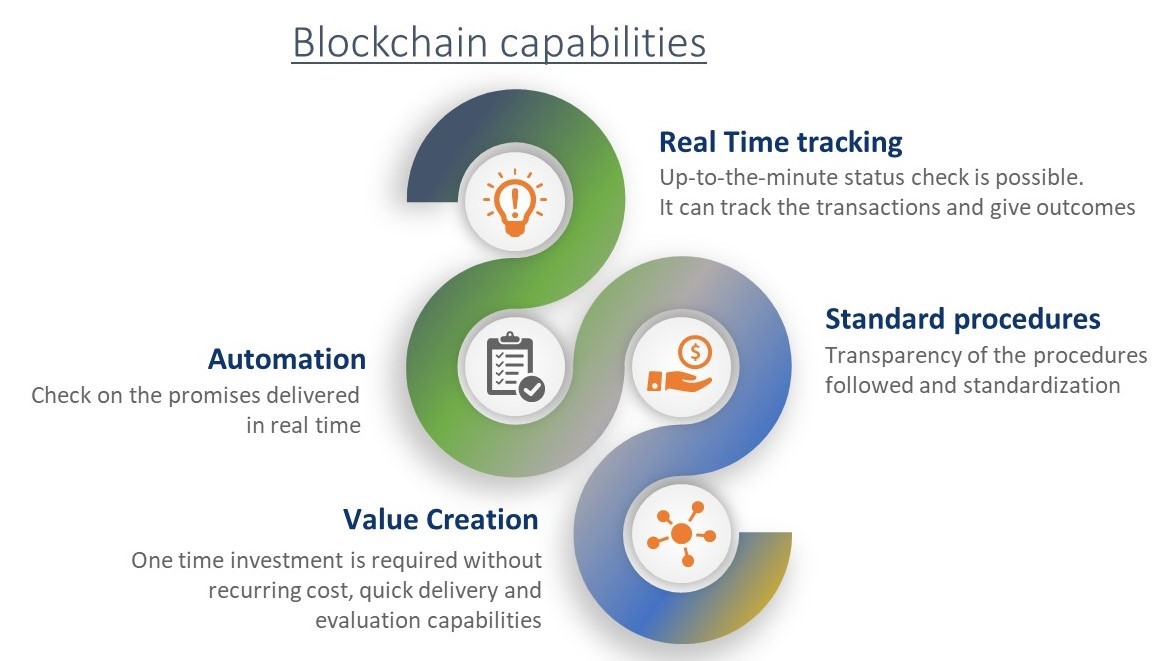The hype around blockchain originally focused only on financial services, but with easier access to the ecosystem there could be many potential applications across other areas including, but not limited to, supply chain, manufacturing, and identity verification.
Put simply, any business process that is based on a certain level of trust between the various parties involved can be an ideal candidate for blockchain implementation. According to a Gartner 2019 report, through 2023, emerging technologies like blockchain will reach a level of maturity that crosses a critical tipping point.
Blockchain is a digital distributed-ledger, which is decentralized, immutable and has a multisource verification model. It facilitates the process of recording transactions and tracking assets in a business network. Each transaction requires consensus among all the concerned parties, and once validated it is permanently recorded. This results in a traceable workflow that is transparent in nature.
The consumer-packaged goods industry is a high-volume industry comprising a plethora of vendors. Vendor management, therefore, is a critical process especially when an organization’s own business model has been developed around the capabilities of its vendors. If a vendor is unable to meet the deliverables as stated in the contract, most organizations have to take appropriate actions to control the business environment and mitigate any potential loss-making situations. However, this vendor evaluation process is a heck of a task for businesses, which not only delays the on-boarding of a vendor but also requires time to release them from a job.
Consider an ecommerce marketplace, where there are millions of third-party vendors, making it difficult for an ecommerce business to tackle issues such as adherence to contractual terms, or monitor for counterfeit products and other quality issues. Also, sensitive products such as fashion, apparel and footwear have a return rate of almost 30 percent owing to issues like quality and authenticity. With each change of hand, the quality of a product can be compromised, which could result in a loss-making deal for the business.
Figure 1

As noted in Figure 1 above, we can map out that customer decisions are changing due to the “free-shipping” factor and the availability of hassle-free returns. Thus, for companies to remain competitive, free returns with added benefits has become a minimum criteria. However, many companies are incurring huge losses due to the cost incurred in providing a free return service to customers.
Research shows that out of the 30 percent of product returned, 65 percent is due to mistakes by the merchant, which leads to a significant decrease in the customer satisfaction index and hampers the overall customer lifetime value. Moreover, in addition to losing business the company also bears the burden of reduced margins and loss of revenue due to the cost of reverse logistics. Such issues can be tackled by implementing blockchain based solutions into the entire reverse logistics process.
Blockchain for vendor management
Among E-commerce companies the business model is based around the capabilities of its vendors and merchants. Therefore, having a good team of merchants as well as good methods for evaluating the merchant in place are quintessential for surviving the cutthroat competition.
Blockchain's unique capabilities are illustrated below in Figure 2.
Figure2.

Among them is the ability to link with all previous transactions and remaining untampered due to decentralizization. Blockchain handles this function of vendor management and evaluation with greater efficiency. It empowers businesses to ensure the authenticity and traceability of all goods throughout the entire purchasing cycle, based on which a vendor evaluation system can be established. For example, to rate any vendor linked with the system, a unique code can be generated for that particular vendor and every transaction linked to that account can be accessed instantaneously.
That means all vendor non-compliance issues can be monitored, allowing for up-to-date and accurate vendor ratings. Consequently, that will help the vendor get a quick evaluation and feedback from the system, and also, make timely decisions to improve its capabilities and ensure smooth running of operations.
This allows merchants to get a better handle on which vendors are negatively impacting their bottom line, and which are reliable and positive partners. Businesses can then make more profitable and informed decisions on which vendors they should continue to work with and which they should dump.
Sahil Guleria and Alok Sharma are consultants to the consumer packaged goods industry with the consulting firm Wipro Limited.
SC
MR

Latest Supply Chain News
Latest Resources

 Explore
Explore
Latest Supply Chain News
- Scaling fast-food warehouse operations in a best-case scenario
- NextGen Leader: Kory Jacobson
- How to Optimize Your RFID Mandate Labeling within the Supply Chain
- Schneider Electric maintains spot atop Gartner’s Top 25 supply chains
- Is your quality management strategy behind the AI curve?
- From farm to table: Using data to ensure a transparent and traceable supply chain
- More latest news
Latest Resources

Subscribe

Supply Chain Management Review delivers the best industry content.

Editors’ Picks





